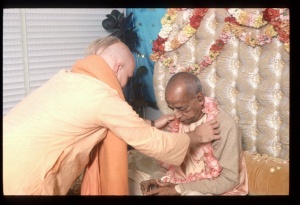SB 4.19.13: Difference between revisions
m (1 revision(s)) |
No edit summary |
||
| Line 1: | Line 1: | ||
{{info | {{info | ||
|speaker=Maitreya | |speaker=Maitreya Ṛṣi | ||
|listener=Vidura | |listener=Vidura | ||
}} | }} | ||
[[Category:Srimad-Bhagavatam - Canto 04 Chapter 19]] | |||
[[Category:Bhagavatam Verses Spoken by Maitreya Rsi - Vanisource|041913]] | |||
<div style="float:left">'''[[Srimad-Bhagavatam]] - [[SB 4|Fourth Canto]] - [[SB 4.19: King Prthu's One Hundred Horse Sacrifices|Chapter 19: King Pṛthu's One Hundred Horse Sacrifices]]'''</div> | |||
<div style="float:right">[[File:Go-previous.png|link=SB 4.19.12]] '''[[SB 4.19.12]] - [[SB 4.19.14]]''' [[File:Go-next.png|link=SB 4.19.14]]</div> | |||
{{RandomImage}} | |||
==== TEXT 13 ==== | ==== TEXT 13 ==== | ||
<div | <div class="verse"> | ||
atriṇā codito hantuṁ | :atriṇā codito hantuṁ | ||
pṛthu-putro mahā-rathaḥ | :pṛthu-putro mahā-rathaḥ | ||
anvadhāvata saṅkruddhas | :anvadhāvata saṅkruddhas | ||
tiṣṭha tiṣṭheti cābravīt | :tiṣṭha tiṣṭheti cābravīt | ||
</div> | </div> | ||
| Line 16: | Line 22: | ||
==== SYNONYMS ==== | ==== SYNONYMS ==== | ||
<div | <div class="synonyms"> | ||
''atriṇā''—by the great sage Atri; ''coditaḥ''—being encouraged; ''hantum''—to kill; ''pṛthu-putraḥ''—the son of King Pṛthu; ''mahā-rathaḥ''—a great hero; ''anvadhāvata''—followed; ''saṅkruddhaḥ''—being very angry; ''tiṣṭha tiṣṭha''—just wait, just wait; ''iti''—thus; ''ca''—also; ''abravīt''—he said. | |||
</div> | </div> | ||
| Line 23: | Line 29: | ||
==== TRANSLATION ==== | ==== TRANSLATION ==== | ||
<div | <div class="translation"> | ||
When the son of King Pṛthu was informed by Atri of King Indra's trick, he immediately became very angry and followed Indra to kill him, calling, "Wait! Wait!" | When the son of King Pṛthu was informed by Atri of King Indra's trick, he immediately became very angry and followed Indra to kill him, calling, "Wait! Wait!" | ||
</div> | </div> | ||
| Line 30: | Line 36: | ||
==== PURPORT ==== | ==== PURPORT ==== | ||
<div | <div class="purport"> | ||
The words tiṣṭha tiṣṭha are used by a kṣatriya when he challenges his enemy. When fighting, a kṣatriya cannot flee from the battlefield. However, when a kṣatriya out of cowardice flees from the battlefield, showing his back to his enemy, he is challenged with the words tiṣṭha tiṣṭha. A real kṣatriya does not kill his enemy from behind, nor does a real kṣatriya turn his back on the battlefield. According to kṣatriya principle and spirit, one either attains victory or dies on the battlefield. Although King Indra was very exalted, being the King of heaven, he became degraded due to his stealing the horse intended for sacrifice. Therefore he fled without observing the kṣatriya principles, and the son of Pṛthu had to challenge him with the words tiṣṭha tiṣṭha. | The words ''tiṣṭha tiṣṭha'' are used by a ''kṣatriya'' when he challenges his enemy. When fighting, a ''kṣatriya'' cannot flee from the battlefield. However, when a ''kṣatriya'' out of cowardice flees from the battlefield, showing his back to his enemy, he is challenged with the words ''tiṣṭha tiṣṭha''. A real ''kṣatriya'' does not kill his enemy from behind, nor does a real ''kṣatriya'' turn his back on the battlefield. According to ''kṣatriya'' principle and spirit, one either attains victory or dies on the battlefield. Although King Indra was very exalted, being the King of heaven, he became degraded due to his stealing the horse intended for sacrifice. Therefore he fled without observing the ''kṣatriya'' principles, and the son of Pṛthu had to challenge him with the words ''tiṣṭha tiṣṭha''. | ||
</div> | </div> | ||
__NOTOC__ | |||
<div style="float:right; clear:both;">[[File:Go-previous.png|link=SB 4.19.12]] '''[[SB 4.19.12]] - [[SB 4.19.14]]''' [[File:Go-next.png|link=SB 4.19.14]]</div> | |||
__NOTOC__ | |||
__NOEDITSECTION__ | |||
Revision as of 10:57, 21 May 2021

A.C. Bhaktivedanta Swami Prabhupada
TEXT 13
- atriṇā codito hantuṁ
- pṛthu-putro mahā-rathaḥ
- anvadhāvata saṅkruddhas
- tiṣṭha tiṣṭheti cābravīt
SYNONYMS
atriṇā—by the great sage Atri; coditaḥ—being encouraged; hantum—to kill; pṛthu-putraḥ—the son of King Pṛthu; mahā-rathaḥ—a great hero; anvadhāvata—followed; saṅkruddhaḥ—being very angry; tiṣṭha tiṣṭha—just wait, just wait; iti—thus; ca—also; abravīt—he said.
TRANSLATION
When the son of King Pṛthu was informed by Atri of King Indra's trick, he immediately became very angry and followed Indra to kill him, calling, "Wait! Wait!"
PURPORT
The words tiṣṭha tiṣṭha are used by a kṣatriya when he challenges his enemy. When fighting, a kṣatriya cannot flee from the battlefield. However, when a kṣatriya out of cowardice flees from the battlefield, showing his back to his enemy, he is challenged with the words tiṣṭha tiṣṭha. A real kṣatriya does not kill his enemy from behind, nor does a real kṣatriya turn his back on the battlefield. According to kṣatriya principle and spirit, one either attains victory or dies on the battlefield. Although King Indra was very exalted, being the King of heaven, he became degraded due to his stealing the horse intended for sacrifice. Therefore he fled without observing the kṣatriya principles, and the son of Pṛthu had to challenge him with the words tiṣṭha tiṣṭha.